Thailand is one of the most popular vacation spots due to its beautiful beaches, delicious cuisines, unique culture, and friendly people. There is no doubt that Thailand is worth paying a visit for a vacation.
But if you’re thinking of moving to the country for work, study, retirement, or simply to enjoy the exotic lifestyle – you’ll certainly be wondering if Thailand is a good place to live or not?
Thailand can be the perfect place for many but a complicated location for others. Thailand comes with fair living expenses, diverse culture, sceneries, friendly locals, and cuisines. However, the country has some language barriers and political instability. Also, a lack of available student jobs.
Like any country, living in Thailand has its pros and cons.
This article considers the main positives and negatives for expats and retirees to help determine if it is the right place for you. So, keep reading before booking your one-way ticket to the Land of Smiles.
Living in Thailand Pros and Cons
Thailand’s favorable living costs are one of the biggest reasons why it it attracts so many expats and digital nomads. Compared to other major cities around the world, Bangkok and Chiang Mai provide excellent value for money.
Thailand also has an endless list of beautiful places for you to explore. However, there are also drawbacks expats might face when moving to Thailand – such as the infamous Bangkok traffic and potential health concerns of living in a tropical country.
Let’s look at pros and cons of living in Thailand in more detail.
The Pros: Is Thailand a Good Place to Live?
Job Opportunities

Even though work visa and work permit requirements for foreigners can be a bit complicated, there is a wide range of jobs possible for expats in Thailand.
There are several advantages for foreign investors in Thailand as well. As for the expats who are seeking employment in Thailand, the following are some types of jobs that are possible for expats to try:
Teaching Jobs:
The easiest and largest job market in Thailand for expats is the English teaching jobs- especially for those from western countries (8). From elementary schools and kindergartens to vocational colleges and universities, positions for native-speaking English teachers are available for expats to apply.
In addition to the job position for English language teachers, international schools and other private schools in Thailand that teach in English also sought native English-speaking teachers to fill in the classes for other subjects taught in English, such as science and mathematics (8).
The minimum requirement to work in Thailand as an English teacher is to have a Bachelor’s degree in any field from a 4-year university; the degree doesn’t necessarily have to be in English or Education.
Also, the hiring schools often require a recognized TEFL certificate as Thailand is a very popular country for people to get their TEFL certifications (8).
In order to work legally as a teacher in Thailand, one will need to have a teacher’s license, a non-immigrant ‘B’ visa, and a work permit (8)- all of which are usually sorted out by the hiring school or university for the expats.
Jobs in the IT Field:
There is an increasing number of job opportunities for expats specializing in the tech field. Some of the most in-demand skills are PHP back-end development, Javascript for both back-end and front-end web development, and mobile app development for Android and iOS (8).
Salary per month for a senior web or software developer could be as high as 100,000 THB, which can be considered quite good for Thailand’s living standards (8). Another good thing about working in the IT field is that it is usually possible to work remotely as well.
Minimum requirements for expats are to have a relevant degree, as well as at least 2 to 5 years of experience in the related field (8).
Tourism Professions:
The tourism industry itself is a large part of the country’s economy. While jobs like tour guides are restricted to only Thai nationalities, there are many job opportunities offered by top-end hotels for foreigners. There is a popular demand for people with good experience and qualifications in hotel management and chef positions (8).
For positions like hotel manager, expats with the necessary educational background and several years of experience in hotel management can land a job at one of the prominent 5-star hotels in major cities like Bangkok, Phuket, or Koh Samui.
Foreign chefs with experience of 5 years and above can also get offers to work as head chefs at some of Bangkok’s finest restaurants and hotels, especially for areas like western and European cuisines.
Jobs at Multinational Companies:
Finance Manager: One of the job positions that are often available for expats and foreigners in Bangkok is finance and accounting manager.
Those with solid backgrounds and skills in the accounting field can get hired by the big companies in Bangkok, and the salary package is often attractive enough to live comfortably in Thailand as well (8).
Translator/Interpreter : Expats who are native speakers of foreign languages like Japanese, Chinese, Korean, French, Spanish, etc., can try for translator or interpreter positions as many international firms have manufacturing plants located in Thailand.
These firms often need translators or interpreters who are fluent in both Thai and the target foreign language, so for those who happen to be multi-lingual with fluency in Thai, it would be worth giving it a shot at such kinds of jobs (8).
Diverse Culture
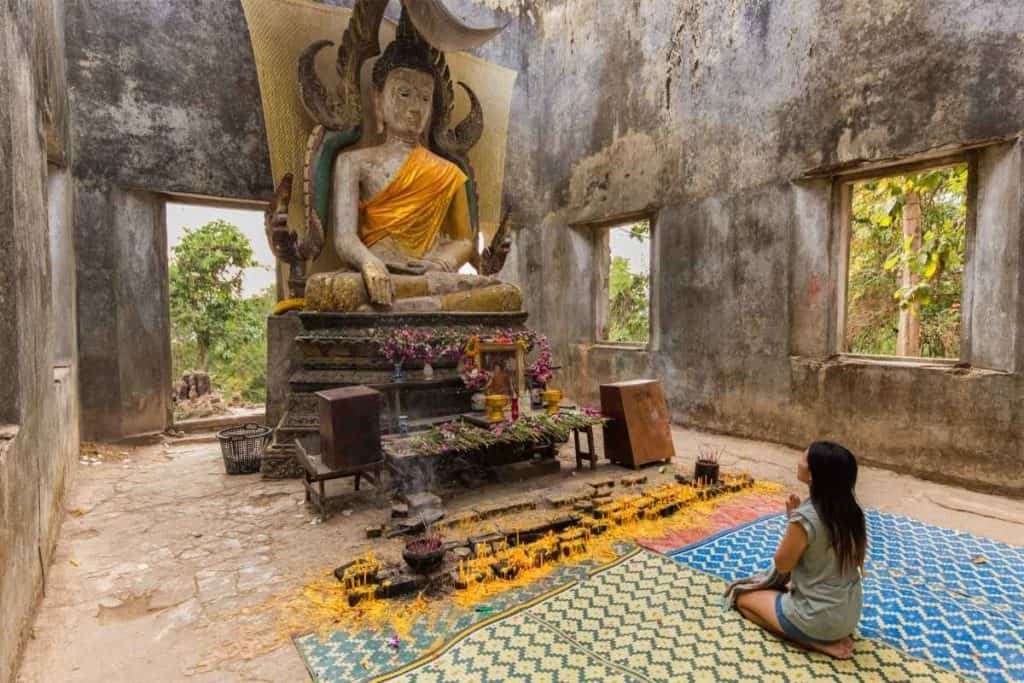
Even though most local people are Buddhists and Thai culture is heavily influenced by religious beliefs, Thailand, however, does not discriminate against other religions. All people are welcome to participate in Thai festivals and practice their faith.
For the most part, locals will offer free food and sometimes, even accommodation to the visitors during the festival. Also, one can visit the temples as long as they follow the rules, such as not wearing revealing clothes or shoes inside the temples, even if they are not Buddhists.
The local people are friendly towards others, regardless of religion or ethnicity. The famous Krabi island is regarded as a Muslim-friendly city due to many Thai Muslim people residing there (8).
Chinese cultural influences can also be found in many places of Thailand as there are many Thai Chinese (also called Sino-Thais) people in the country. The ability to speak a foreign language other than English is also a plus for foreigners planning to get a job in Thailand, especially for Chinese and Japanese speakers.
Culinary Hub
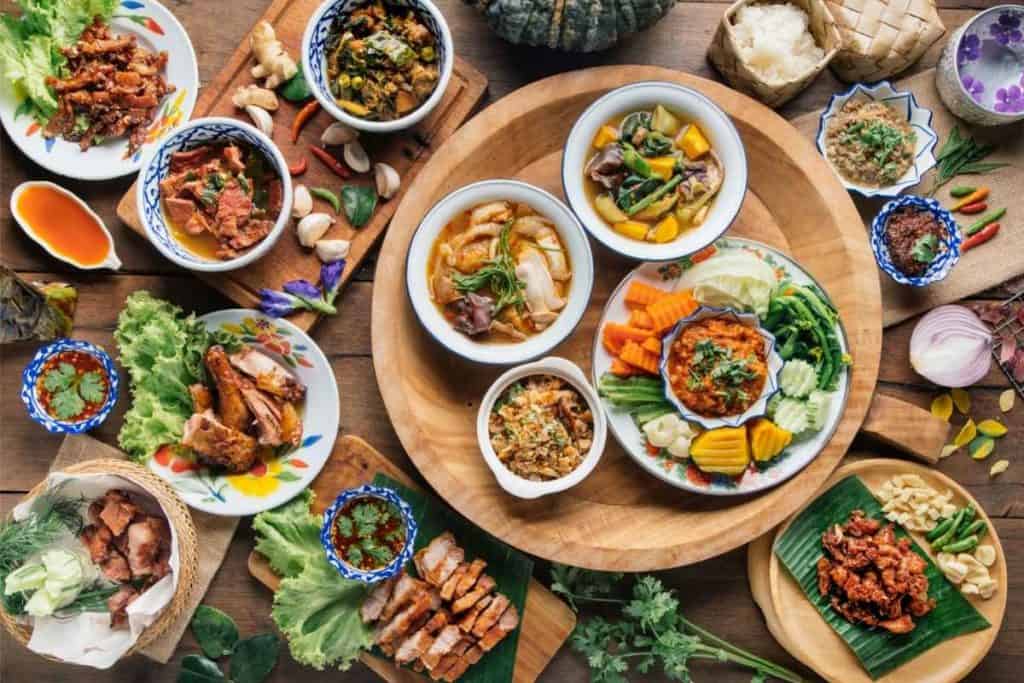
Apart from its fantastic scenery, Thailand is also known for its delicious cuisines. Thai cuisines are delicious and full of flavors, as they use different kinds of spices in most of their dishes. Sometimes, it can be deemed spicy to non-Thai people, especially the westerners who are unfamiliar with such types of herbs, but there are different kinds of dishes for each’s liking.
Moreover, Thai cuisines are not the only type of food available- various cuisines from Japanese, Arabian, Indian and American dishes can be found everywhere and at affordable prices. Thai cuisines usually cost around 50-100 Baht per meal, depending on the restaurant one chooses to eat at.
As for dessert lovers, famous Thai traditional desserts like coconut ice creams and Thai milk tea are everywhere to make one’s day sweeter. Cozy and trendy cafes can be found in every country to enjoy the afternoon reading a book or finishing a report.
The best part is that it is inexpensive to eat out most of the time. Of course, there are expensive restaurants and luxury malls, but most local street food and cooking are affordable and delicious. So, Thailand is a good place (or paradise, really) for those who love good food.
The Cons: Is Thailand a Bad Place to Live?
Traffic Jam Woes
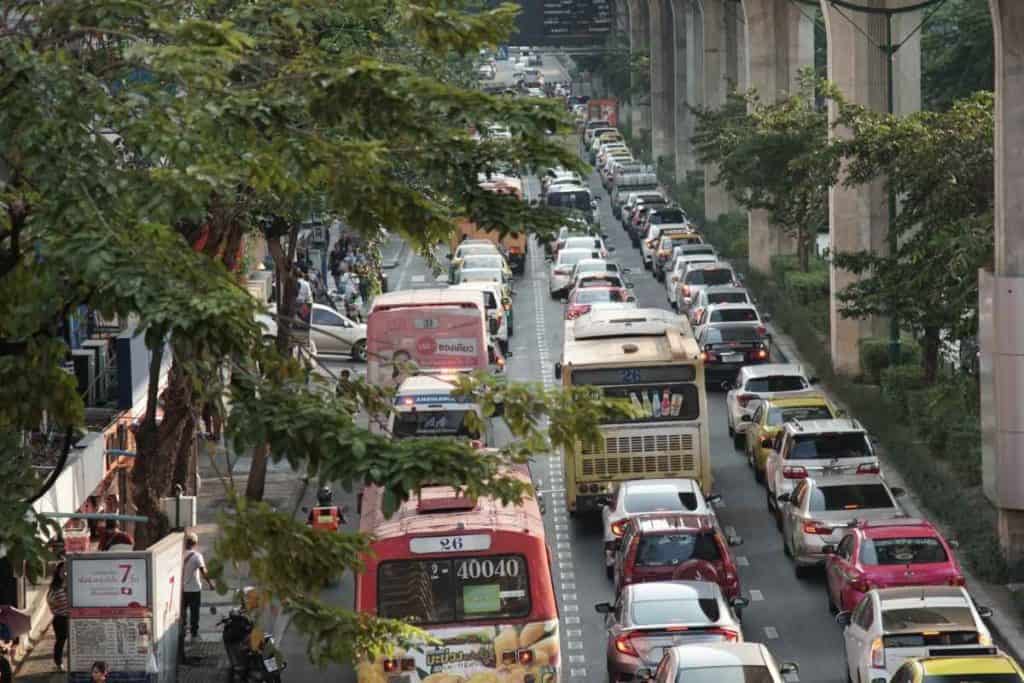
The worst nightmare for everyone living in Bangkok is the infamous Bangkok traffic – which ranks as the worst in South East Asia, followed by Jakarta and Manila. According to a survey made in 2017, drivers in Bangkok got stuck in the traffic for a total average of 96 minutes per day, which means that vehicle owners in Bangkok spend around 24 days per year caught up in traffic (9).
In addition to bad traffic jams, Thailand was ranked second by WHO as the country with the highest traffic-incident-related fatalities in the world (10). Motorcycles are notorious for over-speeding and careless driving, especially in the small alleyways. It would be best if you were careful while crossing the roads in Thailand or walking in the small alleys, as traffic accidents happen frequently.
Mosquito and Possible Diseases

Thailand, alongside Brazil, Malaysia, and Indonesia, has one of the largest populations of mosquitoes (11). Known as a tropical country with humid weather all year round, in Thailand, mosquitos are most specifically found in the country’s northern area.
In those places, mosquitoes lay their eggs in rainy and gloomy weather. Apart from the itchy mosquito bites and the annoyance mosquitoes bring, they can also cause various diseases- some even are life-threatening.
In Thailand, mosquitoes can cause serious health concerns- such as dengue fever, lymphatic filariasis, Japanese encephalitis, and malaria (12). Due to the high number of instances found and their severity, mosquito-related diseases are considered the major tropical diseases in Thailand.
Among these tropical diseases, malaria is considered one of the most severe concerns in Thailand, as this virus can be highly life-threatening due to increased morbidity and mortality (13). According to the PR Thai Government page on Facebook, there are 3415 reported Malaria cases from 51 provinces, and one fatality and 27% or 936 patients from these reported cases were foreigners (14)- making these mosquito-related diseases a severe concern for the expats.
No Part-time Job for Students
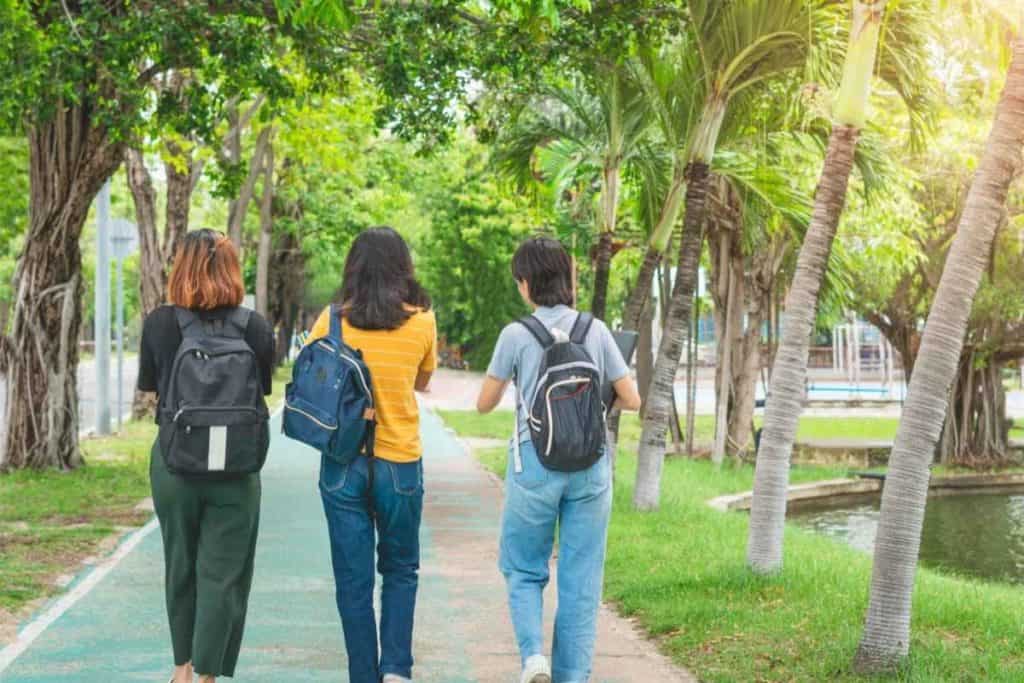
This one is for the students who are planning to move to Thailand for their studies. The education visa, or the ED Visa, for foreign students, does not allow the students to work. This means that there are very few part-time job opportunities for foreign students.
Students can still work online freelancing jobs or internships under the permission of the University, but working at cafes or convenience stores part-time (like in other countries) is not an option for most, if not all, foreign students.
Besides, the majority of Thai people communicate only in local languages, meaning that one needs to be able to speak and understand the Thai language if they want to work part-time jobs in the service sector. Therefore, it is difficult for most foreign students to find part-time or internships during their studies in Thailand.
Retiring in Thailand Pros and Cons
Thailand is a popular destination for retirees as the country is known for its world-recognized health care services and relatively affordable living costs. Although there are many pros to living in Thailand as a retiree, some difficulties are also faced by retirees, such as the scorching weather and language barrier.
Here are some potential pros and cons for people considering retiring in Thailand.
The Pros: Is Thailand a Good Place to Retire?
Health Care

Thailand is known for its globally recognized health care services. In 2019, the US magazine CEOWORLD had placed the country as the sixth country with the best healthcare systems in its list of 89 countries (1).
According to the list, Thailand was given an overall score of 67.99 out of 100 based on a total of five categories- healthcare infrastructure, professionals’ competence, cost, medicine availability, and government readiness (1).
Numerous non-Thai citizens from other parts of Asia, Europe, and even America come to Thailand every year to receive medical treatments. Thailand’s medical tourism industry is well known in areas such as cancer treatment, orthopedics, fertility assistance, dentistry, and cardiovascular medicine.
Doctors in Thailand are also trained in the latest medical procedures and have access to quality equipment, especially in private hospitals. At least 60 Thai hospitals and healthcare institutions have also received certification from the respected Joint Commission International (JCI)- making Thai healthcare professionals highly capable (2).
In 2022, the country initiated its universal coverage program, which opened universal healthcare coverage to all Thai citizens (2).
Under this program, most Thais receive health coverage. At the same time, private employees, including foreigners and expats who hold private-sector jobs, are often covered by a social security system supported by payroll contributions.
As for the tourists and residents who are not qualified for those systems mentioned above, one will need private health insurance to cover the medical bills.
As for the cost of getting medical treatments in Thailand, on average medical treatments cost about 20% of what they would have cost in the US or Europe- hence people from those areas come to Thailand for medical treatments (2).
Here are some of the approximated costs for healthcare in Thailand:
- MRI scan: $190
- Hip replacement: $13,000
- Knee replacement: $11,500
With all these considered, Thailand’s healthcare system and services can be seen as positive attributes for any retirees who want to relocate to Thailand.
Cost Of Living

It is undeniable that even with inflation and an increase in prices, the cost of living in Thailand can still be considered relatively cheap compared to that in the US or Europe. According to data for 2022, the minimum cost of living in the country is $650 (or 21,497 THB) per month (3).
However, there is a slight difference in price depending on the area or city one is living in Thailand. For example, for expats living in Bangkok, the baseline cost is more likely to be around $750 (or 24,804 THB) per month, while for those living in Chiang Mai, they can expect the monthly living cost to be about $600 (or 19,843 THB) (3).
Also, the cost of living depends on the lifestyle that one has. The minimum baseline cost mentioned above is the bare minimum to survive in Thailand, and if one desires to have a luxurious retiree life, the price will be much more than $650 per month.
To give a more detailed view of how much it can cost for the foreign retirees to adopt the luxury lifestyle in a city like Chiang Mai, here is the estimated cost breakdown (4):
| Type of Cost | Estimate Amount of Cost | Notes |
| Rent | $1000 | A nice town in the city center |
| Food | $1000 | An Omakase dinner could cost around 100$ |
| Transportation | $200 | Using an app like Grab and private taxi services |
| Entertainment | $1000 | Night outs at rooftop bars and traveling to nearby cities |
| Miscellaneous | $100 | Internet+Cell Phone Bills |
| Total | $3300 |
For more detailed explanations of the cost of living in Thailand, you can also find more in this article that had been covered before. The bottom line is that it would take at least $650 for a retiree to live in Thailand, and compared to other major cities in the world, this can be considered a plus.
Rich In Nature

Although Thailand is known for its beautiful tropical beaches, that’s not all the country has to offer. Thailand is also home to breathtaking mountain views and more than 140 national parks (5).
Retirees who wish to explore the beautiful nature spots should definitely consider Thailand as their new home because what would be a better way to start the new chapter of one’s life than exploring the many untouched natural beauties located across the country.
Hence, here are some of the most beautiful nature spots for anyone who is considering visiting the country or making it their next home:
Phu Kradueng:
Phu Kradueng National Park is located in the northeast province of Loei. It is one of the country’s most popular natural attractions with its rich diversity of flora and evergreen forests (5).
There are also long trails wrapped around the waterfalls in the park and mesmerizing viewpoints with rest stops throughout the park’s area.
And while the hike up the mountain is steep, one can rest at the multiple rest stops called ‘Sam’- areas where underground water emerges. This National Park is open for visitors from October to May every year.
Ban Rak Thai:
One of the hidden beauties of the country that isn’t as well-known to tourists yet is Ban Rak Thai- a small town located in Mae Hong Son (5).
Built among the lush green hills and tea plantations that overlook the Mae Sa-Nga river, Ban Rak Thai is perfect for a quiet escape from the bustling city life and to experience some leisure sightseeing.
While visiting this remote countryside town, the best time to take memorable photos would be in the morning as it’s the perfect time to take in the serene view of the lake and tea plantations.
Similan Islands:
This eleven-island archipelago is a paradise for nature lovers due to its crystal clear waters and a wide variety of marine life living there, such as dolphins. Similan Islands and beautiful beaches there can be found in the southern province of Phang Nga.
Upon visiting, one can enjoy various activities such as snorkeling, sailboating, and scuba diving. The islands are called a masterpiece of nature, and one should visit them while in the country. The good news is that the islands have reopened for visitors not too long ago, with a limited number of tourists allowed per day (6).
The Cons: Is Thailand a Bad Place to Retire?
Too Sunny For Comfort

Thailand is famous for its sunny beaches and warm, tropical climate. But sometimes, the weather in Thailand can be too hot to the point of discomfort too. This weather condition might not be a problem for everyone. Still, for the people who come from colder climates and are unfamiliar with the heat, especially for the elderly like retirees, it can become a problem.
The weather in Thailand is humid and sunny almost all year round, except for the rainy/monsoon season, where floods are another problem to worry about. The hot season for central and northeastern Thailand occurs from late February to mid-June. It is a common occurrence even for the locals to suffer from heat-related illnesses during the hottest times of the year.
According to reports, an average of 32 people die annually from heatstroke in Thailand (7). Therefore, when the summer weather hits its peak, living in Thailand can come with the risks of heat exhaustion and its related side effects like dizziness, loss of appetite, vomiting, and even anxiety.
Language Barrier
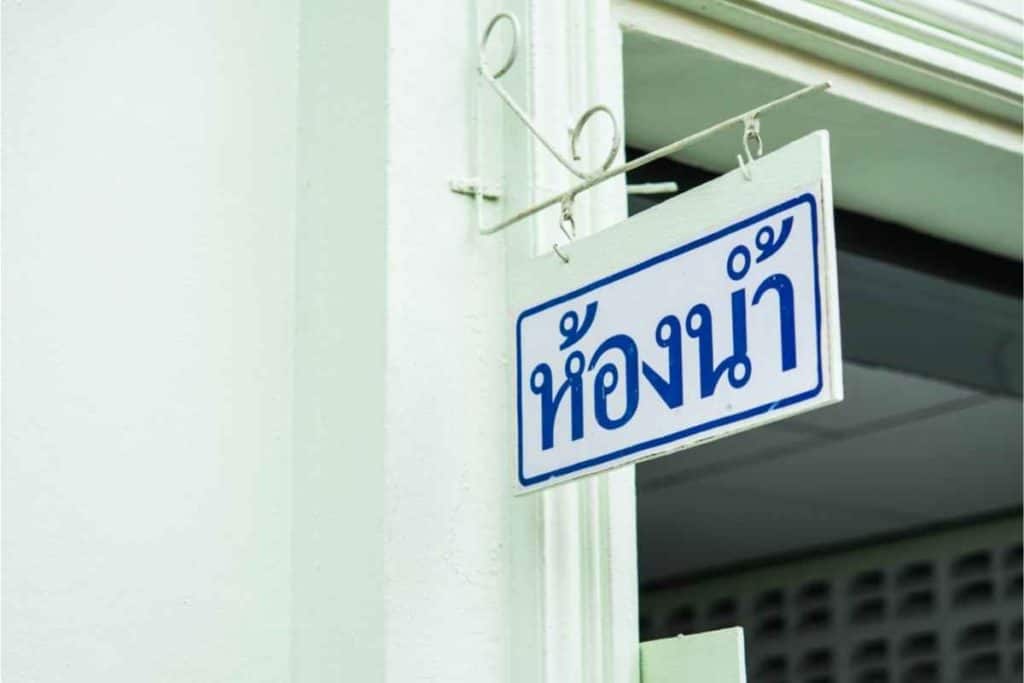
Although Thai people are very willing to help, many can be very hesitant to speak in English as they are worried and shy about their English skills. The older generations of Thai people know limited English. So, it can sometimes be inconvenient, especially when shopping at the local traditional markets. Ordering food at food courts can also be challenging as the vendors are usually of the older generation who speak very limited English.
And although all public transportations have the English translation on them, it can be a bit confusing if you don’t do your research beforehand, as asking for directions is also a challenging task due to the language barrier.
Tinglish, a form of English mixed with Thai, is mainly used by the locals when they communicate with foreigners. However, the younger generation can speak English well and are more willing to communicate with foreigners. Therefore, for retirees to make new same-aged friends or join the local elderly communities might be a very challenging task due to language barriers.
Conclusion
The above points are some possible pros and cons you may face while living or retiring in Thailand. Whether Thailand is a good place for relocation or a bad place to live, it is up to you to decide. If you think the negative aspects will hugely impact your daily life, Thailand might not be the right place for you.
On the other hand, depending on what matters to you, Thailand can also be considered a perfect destination to live – as an expat, a retiree, or both. One thing for sure is that, even with all these pros and cons, it is undeniable that Thailand is a beautiful country with friendly local people that anyone should at least visit once.
Like always, if you want to discover more about Thailand, stay guided with ThaiGuider. You might learn something you never knew about this unique country.
References
1. Post Reporters. Thailand’s Healthcare Ranked Sixth Best In The World . Bangkok Post. [Online] September 9, 2019. https://www.bangkokpost.com/thailand/general/1746289/thailands-healthcare-ranked-sixth-best-in-the-world/.
2. International Insurance. Understanding The Healthcare System In Thailand. International Insurance. [Online] [Cited: June 13, 2022.] https://www.internationalinsurance.com/health/systems/thailand.php/.
3. Angel et al. Thailand Cost of Living ($650) – How Much to Live in Thailand in 2022. A Little Adrift Travel Blog. [Online] [Cited: June 14, 2022.] alittleadrift.com/living-costs-chiang-mai-thailand/.
4. Joe. How much it costs to retire comfortably in Thailand. Retire By 40. [Online] [Cited: June 14, 2022.] https://retireby40.org/how-much-costs-retire-thailand/.
5. Visit Southeast Asia. Best Nature Spots In Thailand. Visit Southeast Asia. [Online] [Cited: June 14, 2022.] https://www.visitsoutheastasia.travel/guides/best-nature-spots-in-thailand/.
6. Thai PBS World. Thailand’s Similan Islands Reopen With Limited Tourist Numbers Allowed. Thai PBS World. [Online] October 15, 2021. https://www.thaipbsworld.com/thailands-similan-islands-reopen-with-limited-tourist-numbers-allowed/.
7. Pisuthipan, Arusa. Some Don’t Like It Hot. Bangkok Post. [Online] April 15, 2019. https://www.bangkokpost.com/life/social-and-lifestyle/1661784/some-dont-like-it-hot/.
8. Zander, Ryan. A Comprehensive Guide To Expat Jobs In Thailand: 15 Different Roles For Foreigners. iglu. [Online] May 22, 2021. https://iglu.net/a-comprehensive-guide-to-expat-jobs-in-thailand/.
9. Inshimajid. A 4-Day Itinerary To Muslim-Friendly Krabi, Thailand. Inshirah Majid. [Online] March 25, 2020. https://inshirahmajid.com/2020/03/25/itinerary-muslim-friendly-krabi-thailand/.
10. Boonnoon, Jirapan. Bangkok Worst In SE Asia For Traffic Jams: Survey. The Nation Thailand. [Online] November 7, 2017. https://www.nationthailand.com/Corporate/30331056/.
11. Bangkok Post. Thailand Tops Road Death Ranking List. Bangkok Post. [Online] December 12, 2017. https://www.bangkokpost.com/thailand/general/1376875/thailand-tops-road-death-ranking-list/.
12. Mosquito Squad of Greater Washington DC. Worst Places In The World For Mosquitoes. Mosquito Squad. [Online] July 12, 2014. https://www.mosquitosquad.com/greater-dc/about-us/blog/2014/july/worst-places-in-the-world-for-mosquitoes/.
13. Bumrungrad International Hospital. Stay Safe Against Thailand’s Mosquitoes. Bumrungrad International Hospital. [Online] October 4, 2015. https://www.bumrungrad.com/en/health-blog/july-2015/stay-safe-against-thailand-s-mosquitoes.
14. CDC. Drug Resistance In the Malaria-Endemic World. CDC. [Online] July 23, 2018. https://www.cdc.gov/malaria/malaria_worldwide/reduction/drug_resistance.html.
15. Government, PR Thai. The Department Of Disease Control Has Urged The Public To Beware Of Malaria, Which Is Spread By Mosquitos During The Rainy Season. PR Thai Government. [Online] September 22, 2020. https://www.facebook.com/thailandprd/posts/the-department-of-disease-control-has-urged-the-public-to-beware-of-malaria-whic/3597242406965814/.
THINKING ABOUT A TRIP TO THAILAND?
I am working on a FREE Thailand Travel Guide with a FULL 7 Day Itinerary. Be the first to receive it!
Thank you for signing up.
Something went wrong.
